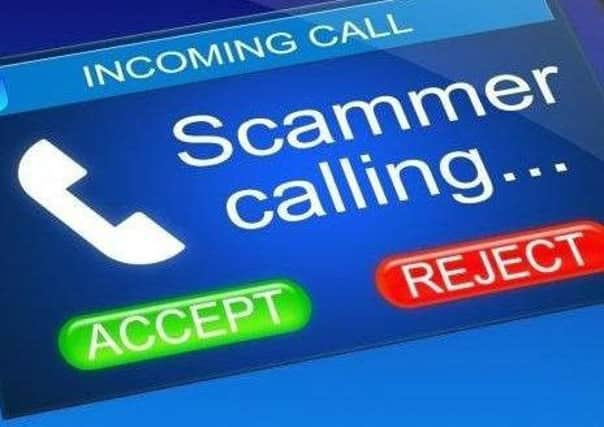Online and phone scammers have a dangerous new trick '“ Jane Bradley


The other day, my friend answered a call to her mobile phone and received a nasty shock. “Hello,” said the voice on the other end. “I’m calling from HMRC. There have been indications that you have committed tax fraud between 2012 and 2017. You owe more than £6,000.”
My friend was more than slightly concerned. The fact that the call had come just days after she had submitted her self-assessment tax return to HM Revenue and Customs for this year tipped her towards believing that this nightmare could possibly be true.
Advertisement
Hide AdAdvertisement
Hide AdWhen she quickly checked the number which displayed on her phone screen during the call against the legitimate number cited by HMRC on its own website, they matched. When they called her back a few hours later, it again, appeared to be a call from the real HMRC number. The voice continued to tell her that the tax authorities were pressing serious charges against her and had a warrant for her arrest. They had case numbers and ID numbers. They asked her repeatedly if she had been aware of the fraud, or if it had been done without her knowledge.
They told her that she needed to hire a tax lawyer – or pay the full amount immediately. It was then that she became suspicious and hung up.
During the call, she spoke to a number of different people and all were equally plausible and knowledgable about the situation. As my friend has been predominently a stay-at-home parent for a while, but has small amounts of money coming in from a variety of different sources, she was concerned that somehow she might have been overlooking a payment she needed to make for years. She was pretty certain that she hadn’t – and hires a reliable accountant to manage her tax affairs – but suddenly, at seven months pregnant and alone in the house, she felt uncertain. And vulnerable – which is what the scammers play on. It seems that scams – and pretty sophisticated ones at that – are on the rise. The Annual Fraud Indicator from Action Fraud estimates the cost of fraud to the UK is £190 billion a year.
Previously, scams were limited to badly spelled emails claiming that an African prince was in need of help and needed thousands of pounds to be transferred to his bank account immediately. You could spot those a mile off. But the latest round are far more sophisticated.
The fact that the scammers could somehow alter their displayed phone number to match that of the real HMRC is terrifying – this is a fairly new addition known as “phone spoofing”. Yet it is not unusual.
John MacKenzie, partner at law firm Shepherd and Wedderburn in Edinburgh, tells me that scams are becoming increasingly intricate, tricking even the most canny of consumers. “The scams are getting more and more sophisticated, and more and more concerning for the individual user or business,” he said. “The quality of the emails is getting better and so it’s difficult to, at a glance, pick out a scam.”
As well as faking phone numbers in calls, fraudsters can also replicate mobile numbers in text messages sent to consumers – which they then believe to be from their bank – as they appear on the same text message conversation as legitimate messages from the customer’s financial institution. Using advanced technology, the scammers insert special meta data into the transmission of the text message – so that, although it looks like it has come from the bank’s number, it has not.
Just this week, consumers were warned to be on the lookout for fraudulent messages claiming to be from the Driver and Vehicle Licensing Agency (DLVA). The government agency, which overseas matters such as driving licences and vehicle tax has issued a warning over emails and text messages that appear to be from it asking for personal information such as bank details. Another legitimate-looking email, this time purporting to be from the TV Licensing people, has also been doing the rounds.
Advertisement
Hide AdAdvertisement
Hide AdI got it myself and had to do a double take before I realised what it was. “We’re sorry to let you know that the TV license could not be automatically renewed,” it said. “Something has gone wrong with your payment.” I did think for a split second that it could be real. One way to quickly identify a scam is to take a look at the email address it has come from. While the inital name which flashes up on the top of the email may seem legit, the actual address may be very different. In the case iof the email I was sent, it was nothing to do with TV licensing at all and was instead, a strange-sounding personal address.
What is interesting about both the scam my friend almost fell for and the TV Licensing one is that they both link back to a legitimate website. My friend was told HMRC’s web address over the phone. When she checked it, of course, it was the real site. Yet because it wasn’t asking her to do anything via the site, that made no difference.
Mackenzie’s advice is clear: “Pay attention to your bank or the relevant authority,” he says. “If they say they do not ever ask you to transfer money online, anyone who does is not legitimate.” Listen to the man – and be on your guard.